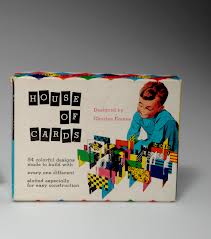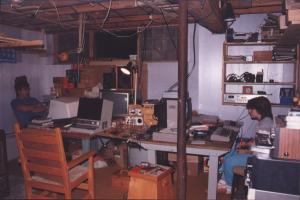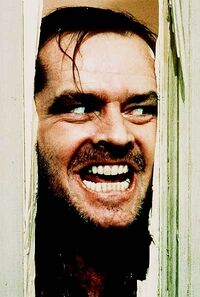Netflix
 Netflix's logo, borrowed from a horror TV series of the same name | |
| Type | "Screaming" media provider |
|---|---|
| Slogan | "Quality is of last priority" |
| Established | 1997 |
| Founder(s) | Reed Hastings and Flicka |
| Headquarters | Countries with no cable television |
| Industry | TV |
| Products | Everything a regular TV channel provides, but for a higher price and with a wider range of problems |
Netflix is an Internet on-demand provider of viewable media, such as movies never shown in theaters; movies impossible to find on regular TV channels; and movies you wouldn't watch even if they were.
The profile of Netflix has been evolving constantly since its foundation in 1997. The company revolutionized the video market with the idea that undesired content could be recorded on DVD disks and sent to viewers by regular mail. After largely putting video stores out of business, it changed its emphasis to Internet screaming and then to production of content, so as to even the score by putting itself out of business.
History
Founding
The seeds of the downfall of the traditional video store were planted during the U.S. Senate hearings on the elevation of Robert Bork to the Supreme Court. When his opponents obtained records that he had rented How the West Was Won, but never Debbie Does Dallas, Bork acquired an unshakable reputation for being out-of-fashion and his nomination failed. Although Congress raced to extend privacy protection to rental records that would later be extended to medical records, the public began avoiding video stores as it would go on to avoid hospitals.
In 1997, the founders of Netflix — Internet maven Reed "Net" Hastings and a companion named Flicka — saw a way that the average American could obviate the video store entirely. The customer could order movies from the privacy of home, after simply putting his complete bank information and credit score on the Internet. Videos would be sent to him using the very private U.S. Postal Service. The world sat up and took notice — though in 2000, Blockbuster instead rolled over and played dead, which before long was not play.
Expansion
But a problem remained: In the time it took the Postal Service to actually deliver a DVD, Netflix customers often changed their minds. Moreover, the DVDs acquired scratches on their way to the mailboxes that eliminated their utility as anything but frisbees, beer trays, and ninjastars. It was Flicka who devised the solution. The gifted equine was convinced that people putting coins into Coca-Cola machines were not interested in buying sugar, water, or aluminum cans (Flicka being unaware of caffeine) but happiness. The obvious solution was to station new red-and-white machines outside supermarkets, alongside the Coke machines, that dispensed the desired product directly.
Soon after, Netflix devised an even faster route to the patron's neural network: "Video screaming." The viewer could request a movie and it would "scream" across the Internet directly into his eyes.
In 2010, Netflix expanded to Canada. This required software to enforce the "domestic content" laws and ensure that local customers ordered at least 50% dreadful Canadian productions, such as Adam Sandler movies with 0% ratings on Rotten Tomatoes.
Original programming
Netflix was now awash in money and large enough to make inroads into content. The goal was not just to rent those little round coasters but to own the patterns engraved on their undersides. Slow-moving companies such as Paramount and Comcast could never surpass the nimble Netflix. Acquiring original content meant that more movies would briefly display the Netflix logo for several seconds before the viewer returned from the kitchen.
The first gamble was a TV series, House of Cards. To avoid controversy, young producer Beau Willimon made its theme the idle cliché, "Power corrupts" — inadvertently creating a remake/reboot of at least one hundred other productions. Netflix saw the show as allegory aimed at its critics (see Legal problems and controversies) and eagerly purchased the work.
Additional content buys, such as Hemlock Grove and Orange is the New Black, served to assert that Awful was the new Emmy®-winning. The shows were not just more awful than conventional productions, but on-demand Awful, available instantly, worldwide. The world, awash in Awful, would never be the same, although it was.
Netflix has since been creating sequels to successful movies (not that that made the sequels successful), sequels to the sequels, and TV shows based on all of the above, then renewing each for two or three seasons.
Technical details
Screaming video using computers let Netflix require not only that the customer bank over the Internet, but also download software and let it take over his computer. Fortunately, much of the software is written by Microsoft, which means there is absolutely nothing to worry about.
Netflix now screams video onto a plethora of devices. Netflix has stated that a single piece of awful video has to be put in 21 formats, including Odd Ogg and Thomas Dolby, to ensure that everyone can view it equally awfully. Future plans include extending this coverage:
- To old-timers with black-and-white televisions with only Channels 2 through 12, by using either the Postal Service or drones to locate a tiny broadcast station in the subscriber's driveway.
- To survivalists who have nothing but a shortwave radio in the basement, using similar techniques.
Netflix uses "adaptive screaming" to adjust transmission quality to match a customer’s broadband connection, real-time conditions, and above all his willingness to pay extra.
Businessmen being businessmen, the new high-tech offerings carried irresistible temptation to abandon the low-tech ones. Thus, in 2011, co-founda Flicka blogged that the company was "spinning off" a new firm with the amusing name of Qwikster, consisting of all the "legacy" businesses of Netflix that had never been qwik to begin with. The good news was that every Netflix subscriber would automatically have a free Qwikster account, in case they insisted on receiving DVDs by post. The bad news was a variety of new charges to do things that used to be free.
The Internet then began a period of real screaming. Seeing that the spin-off had spun out, Netflix released a new video consisting of everyone in the board room stating, in unison, "Never mind!"
Cultural effects
The chief executive of Netflix has stated that Netflix is a model for what television will look like in the future. Television watchers will "binge watch" as they binge drink. They can watch as much TV as they want, when they want, "at their own pace." They will never have to do anything else but watch TV.
Programs will not have to obey 30-minute and 60-minute boundaries. Programs can be made to run only on Netflix, where it is fine to have a 37-minute or a 400-minute program.
Netflix promises special relief for a program's creative staff. Serials will not need imaginative endings to whet the viewer's appetite to watch the next episode; producers can assume that the viewer has already skipped the ending and is watching the next episode. And the next episode need not begin with a recap of the previous one, because any viewer who is confused by anything can just back up and try to find clarification. A "pilot episode" need not be produced to explain the actors' characters. Any viewer who does not understand why two characters hate one another can fast-forward and find all their clashes.
Steamy, explicit love scenes will be shorter, because the viewer can be expected to put them in a loop to better appreciate the content.
The Netflix model is ideal for programs such as Star Trek, where the viewer can index directly to the five minutes of thoughtful science fiction and actual drama in each episode — although it may tend to make the various episodes blur together faster than they do when viewed normally.
Netflix has had even more dramatic effects on the economics of video production. There is no need to interrupt shows for advertisements, line up sponsors, and censor content so that no one boycotts a car company or a supermarket because the program includes an atheist. Kevin Spacey has stated that, although networks would not take a chance on House of Cards, Netflix ponied up the cash to produce the series, sparing him of the need to shop it to YouTube. Netflix is confident that the billions of dollars provided by advertisers to produce programs can eventually be gotten from the viewer's pocket directly, or that the producers of the show will decide they don't really need it.
The Netflix model has also changed viewer habits. In a 2013 survey, 60% of Americans admitted to binge-watching shows, and half of these either quit their jobs or filed for Permanent Disability to free up more time for manic TV-watching. Netflix has adapted to this by making entire seasons available at once, and has plans to release entire centuries at once. This will let the viewer stay in the basement, view the entire 1900s, and not have to turn to fantasy sports.
Netflix's transformation of society's viewing habits became a matter of legend when Bruce Springsteen wrote his classic hit, 57 Megabytes (And Nothin' On).
Legal problems and controversies
The new techniques of Netflix have had to coexist with the familiar old army of lawyers. Consequently, Netflix has been beset with a litany of legal problems.
Recommendation algorithm
Following in the footsteps of Amazon, Netflix has always sought a way to predict what movies a customer will want to rent, so as to get the jump on the customer and ship it (or scream it) before he finishes ordering it. Since 2006, Netflix has conducted prize competitions for outsiders to devise better ways of predicting the customer's desires.
- A competitor called BigChaos won the prize in 2009 for creative use of wired-up mothers-in-law.
- A team from AT&T called BellEnd made the discovery that customers tend to change their preference in rented movies in the event that someone sets their homes on fire.
The competitors have to demonstrate the utmost of respect for the privacy of Netflix customers; for example, not analyzing the magnetic tapes of actual customer rentals that Netflix loans them in order to "test their algorithms."
Throttling

Netflix sells subscriptions to its services, which in theory let customers rent as many movies as they can, without having their eyes glaze over (though many actually do). This is comparable to humor wikis that let anonymous editors make as many edits as they can. Netflix deals with overuse, as wikis do, with a concept called throttling (in the non-choking-to-death sense): A frequent renter finds that Netflix stops using Priority Mail, Air Mail, and Next Day Delivery, in favor of Second Class, the dreaded Book Rate, and the loathsome Ship-by-Barge service.
Netflix's moves in the area of throttling inspired many other companies, from T-Mobile (where, in the $19-per-month plan, all traffic after the first 100 MB arrives the next month) to Casa México on All-You-Can-Eat Thursdays. Similarly, those who sign up for the Netflix online screaming service may find that their 50th rental of the month barely whispers along the 'Net.
Americans with Disabilities Act (ADA)
Netflix has run afoul of the ADA in the USA, which requires rich businessmen to make "reasonable accommodations" to whiny customers as determined by pandering politicians. In 2011, a class-action lawsuit claimed that Netflix failed to provide closed-captioning so that its movies could be enjoyed by the deaf. Moreover, the lawsuit insisted on a second closed-captioning channel without swears, for viewers whose prudishness rose to the level of a "disability."
In 2012, Netflix set up the Amara wiki to "crowd-source" production of captions — that is, to induce naïve bystanders to type the copyrighted scripts of movies into their computers so that Netflix would not be caught doing so. Netflix further immunized itself by saying it was not bound to actually use the texts once the third parties had finished stealing them.
Despite these initiatives, in 2014, Jon Christian wrote an article in The Week asserting that Netflix subtitles were still of low quality, proving that the corporation hates everyone who is deaf. Stung by this charge, Netflix promptly replied that the issues raised were "under investigation": A committee has met weekly to determine how many of the affected viewers might fork over even more money for good subtitles.
Getting lawyered up
Netflix always slips out of these legal tight spots by the payment of cash (never over 3/5 of which goes to the lawyers) and disclaiming wrongdoing. Customers are offered a free promotion to the next service level for a month, and non-free continuation at that level thereafter. Netflix continually digs itself new holes, such as when it removed from its main page an offer that partners at SlipNFall LLC were aching to take advantage of.
In these legal trysts, Netflix is not always on the bottom. In 2006, Netflix sued Blockbuster for violating two Netflix patents. A year later, the two companies settled. The terms were undisclosed, except that Blockbuster declared that the settlement would not "materially affect" yearly profits, then obligingly finished closing all its stores.
Other Netflixes
In Latin America, where "media" means sock, Netflix franchises accept worn socks and return freshly laundered socks to the subscriber using the respective nation's mail service. As in America, the customer can get an arbitrary number of "media" for a fixed price. The foreign Netflix services are so trustworthy that, when traveling in one of those nations, the best way to secure cash is to hide it in one's socks.
Netflix is also the name of a horror TV series that Netflix provides. It tells the story of a happily married 30-year-old businessman who suddenly discovers Netflix, with disastrous effects on his life. The first season follows his experience; each of the 24-hour-long episodes documents a new day in the protagonist's life. First, amazed at the possibilities the company has to offer, he grows a strange addiction to its products, which only becomes stronger with time. By the end of the first season, through an episode of Hemlock Grove deliberately filled with subliminal messages, Netflix convinces him to abandon his family, work, and hobbies to be able to constantly watch TV shows — just as the viewer is forced to constantly watch him.
See also
| Featured version: 2 September 2014 | |
| This article has been featured on the main page. — You can vote for or nominate your favourite articles at Uncyclopedia:VFH. | |





